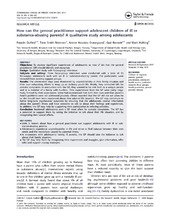How can the general practitioner support adolescent children of ill or substance-abusing parents? A qualitative study among adolescents
Peer reviewed, Journal article
Published version

Åpne
Permanent lenke
https://hdl.handle.net/1956/15934Utgivelsesdato
2016Metadata
Vis full innførselSamlinger
Originalversjon
https://doi.org/10.1080/02813432.2016.1253819Sammendrag
Objectives: To explore significant experiences of adolescents as next of kin that the general practitioner (GP) should identify and recognize. Design: Qualitative study with focus-group interviews. Subjects and setting: Three focus-group interviews were conducted with a total of 15 Norwegian adolescents each with an ill or substance-abusing parent. The participants were recruited from existing support groups. Results: The adolescents’ days were dominated by unpredictability in their family situation and their own exhausting efforts to keep up an ordinary youth life. Mostly, they consulted GPs for somatic complaints. In encounters with the GP, they wanted to be met both as a unique person and as a member of a family with burdens. Their expectations from the GP were partly negatively formed by their experiences. Some had experienced that both their own and their parent’s health problems were not addressed properly. Others reported that the GP did not act when he or she should have been concerned about their adverse life situation. The GP may contribute to better long-term psychosocial outcomes by ensuring that the adolescents receive information about the parent’s illness and have someone to talk to about their feelings and experiences. In addition, the GP may help by supporting their participation in relieving activities. Conclusion: Burdened adolescents seek a GP most often for somatic complaints. The GP has a potential to support them by taking the initiative to talk about their life situation, and by recognizing their special efforts.
